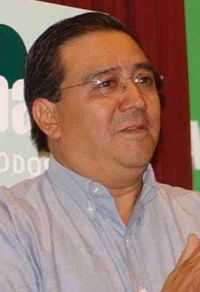Pablo Salazar Mendiguchía

Pablo Salazar Mendiguchía (born in Soyaló, Chiapas, on August 9, 1954) is a Mexican politician and ex-governor.
Biography
Early years and political career
Born to rural teachers who enrolled to him at the age of 17 at the Autonomous University of Puebla, he obtained the title of Lawyer, Notary and Actuary. In 1978 he returned to Chiapas. He professes the evangelical religion of the Church of the Nazarene as secular member. At the age of 28, in 1982, he married Martha López Camacho, with whom at present has 3 children. For 20 years has exercised as educational in levels media and upper, besides the free exercise of his profession.
In 1978, in his 24 years, he was named General deputy Attorney General of Justice. In 1983, he occupied the charge of legal director of the Office of the Secretary of Education and Culture of the State of Chiapas and established the system to apply exams of opposition for the assignment of plazas of master primary teachers. In 1993, he was appointed Executive Director of the Federal Electoral Institute (IFE) that was renounced for being in disagreement with the appointment of acquaintances defraud elections.
He was a Senator of the Republic, from 1994 to year 2000. He was a member of the Commission of Agreement and Pacification (COCOPA). He participated in the elaboration of the Law for the Dialogue, the Conciliation, and the Worthy Peace in Chiapas. Also, he intervened in the editing of the Initiative on rights and native culture, emanated of the San Andrés Accords reached in San Andrés Larráinzar, between the federal government and the Zapatista Army of National Liberation, EZLN.
In the year 2000, his candidacy was supported by an alliance that itself has not repeated anywhere else in the country to meet to social organizations and to eight political parties, of most diverse ideologies: National Action Party, Party of the Democratic Revolution, Labor Party, Ecologist Green Party of Mexico, Convergence of the Democracy, Party of the Nationalist Society, Party of the Democratic Centre, Social Alliance Party.
He was successful in his candidacy, and on August 20, took possession as the governor on December 8, 2000.
Imprisonment
He was in prison on charges including embezzlement of 104 million pesos (U.S. $8.75 million). He was detained June 7, 2011 in the Quintana Roo international airport.[1][2]
Juan Sabines, the governor of Chiapas (December 2006 – Present), spent the greater part of 2011 repeatedly accusing Salazar of corruption and misuse of funds without evidence. These accusations come at the foot of the 2012 elections. Many suspect that Sabines' attacks are based on speculation that Salazar will once again run for public office - which would pose a threat for the current administration.[3] Sabines accused Salazar's administration of stealing 11 billion pesos that had been designated for rebuilding after Hurricane Stan, an accusation that Salazar responded to by publishing a response, "The Truth About Stan." [4] Salazar's office printed 50,000 copies of the document to be distributed throughout the state of Chiapas. At 3 a.m., the morning of June 2, Salazar's office in Tuxtla-Gutierrez, Chiapas, Mexico was violently broken into by armed men who upheld the security guards at Salazar's office. All 50,000 copies of the document were stolen.[5][6] Salazar filed a criminal complaint with the PGR (Federal Police) to investigate the June 2nd break into his office.
On June 7, 2011, Pablo Salazar was arrested at the Cancún airport allegedly on charges of embezzlement and criminal association.[7]
On June 9, Carlos Loret de Mola, a reporter for the newspaper El Universal, published an article about a “secret” document delivered by an official from the current government of Chiapas to the residency of Mexican President Felipe Calderon. The document is entitled “Pablo Salazar Mendiguchia Is a Danger to the Governance of Chiapas.” Said document lists various accusations against Salazar, and asks the federal government to do one of two things: 1) assist in arresting Salazar for any of the accusations listed in the document or 2) have the Secretary of National Defense invite Salazar to exile the country for 18 months (the length of time of the next round of elections and until a new governor takes office in Chiapas). The document is anonymously signed.[8]
On June 14, 2011 Salazar was indicted for alleged acts of corruption. He is not eligible for bail since charges include abuse of political office.
Release from prison
He was released on November 16, 2012. Salazar ruled from December 8, 2000 to December 8, 2006, and he was released only a few days before his successor, the governor Juan Sabines Guerrero, left office on December 8. Therefore, is has been speculated that the arrest of the former governor may have been for political rivalry.[9]
References
- ↑ http://mexicoperspective.com/pablo-salazar-mendiguchia-case.html
- ↑ Thompson, Ginger (19 August 2000). "Defeated Mexico Party Faces Next Test in Chiapas". New York Times. Retrieved 25 January 2011.
- ↑ http://miradasur.com/index.php/noticias/1-latest-news/951-juan-sabines-y-pablo-salazar-en-abierta-confrontacion
- ↑ http://blog.unocontodos.org/2011/05/la-verdad-sobre-la-reconstruccion-de.html
- ↑ http://www.noticiasmvs.com/entrevistas/primera-emision-con-carmen-aristegui/pablo-salazar-mendiguchia-con-carmen-aristegui-111.html
- ↑ http://blog.unocontodos.org/2011/06/p-padding-bottom-0px-juan-sabines.html
- ↑ Varillas, Adriana (7 June 2000). "Detienen en Cancún a Salazar Mendiguchía". El Universal (México). Retrieved 7 June 2011.
- ↑ http://www.eluniversal.com.mx/columnas/90048.html
- ↑ http://www.animalpolitico.com/2012/11/confirman-liberacion-de-salazar-mendiguchia/#axzz2EVlfqWVR
| Preceded by Roberto Albores |
Governor of Chiapas 2000-2006 |
Succeeded by Juan Sabines |
|